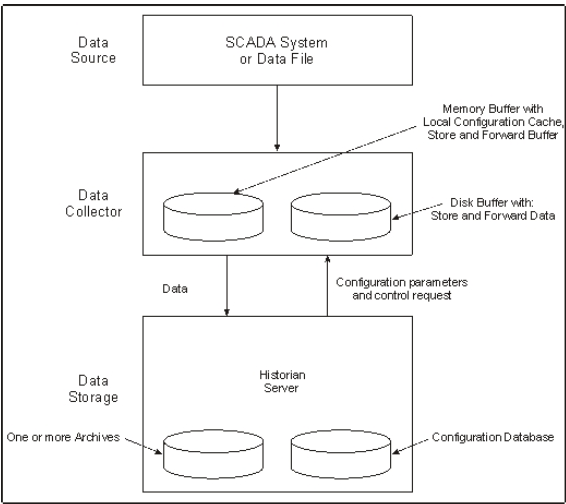About Historian Data Collectors

| Collector Name | Description | Is Toolkit-Based? | Consumes a CAL? |
|---|---|---|---|
| The Calculation collector | Performs data calculations on values stored in the archiver. | No | Yes |
| The CygNet collector | Collects data from a CygNet server. | Yes | Yes |
| The File collector | Imports CSV and XML files into Historian. | No | No |
| The HAB collector | Collects data from Habitat. | Yes | |
| The iFIX Alarms and Events collector collector | Collects alarms and events data from iFIX. | No | No |
| The iFIX collector | Collects tag data from iFIX. | No | No |
| The MQTT collector | Collects data published to a topic using an MQTT broker. | Yes | Yes |
| The ODBC collector | Collects data from an application based on an ODBC driver. | Yes | Yes |
| The OPC Classic Alarms and Events collector | Collects data from an OPC Classic Alarms and Events server (such as CIMPLICITY). | No | No |
| The OPC Classic DA collector | Collects data from an OPC Classic Data Access (DA) server (such as CIMPLICITY). | Yes | Yes |
| The OPC Classic HDA collector | Collects data from an OPC Classic Historical Data Access (HDA) server (such as CIMPLICITY). | Yes | Yes |
| The OPC UA Data Access (DA) collector | Collects data from an OPC UA DA server (such as CIMPLICITY). | Yes | Yes |
| The OSI PI collector | Collects data from an OSI PI server. | No | No |
| The Python collector | Run Python scripts on tag values and stores them in Historian | No | No |
| The Server-to-Server collector | Collects data from a Historian server and sends it to another Historian server. | No | Yes |
| The Server-to-Server distributor | Collects data from a smaller Historian server and sends it to a larger, centralized Historian server or a cloud destination. | No | Yes |
| The Simulation collector | Generates random numbers and string patterns for testing/demonstration purposes. | No | No |
| The Windows Performance collector | Collects Windows performance counter data. | Yes | Yes |
| The Wonderware collector | Collects data from a Wonderware Historian 2014 R2 server. | Yes | Yes |
Data collectors use a specific data acquisition interface that match the data source type, such as iFIX Easy Data Access (EDA) or OPC 1.0 or 2.0 (Object Linking and Embedding for Process Control). For more information, see Supported Acquisition Interfaces. The Simulation collector generates random numeric and string data. The File collector reads data from text files.
Limitations: When failover occurs from a primary collector to a secondary collector (or vice versa), there will be some data loss as the collector tries to connect to the source to fetch the data.